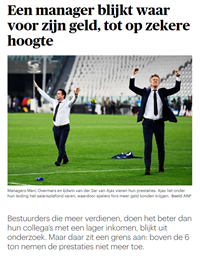Stoker, Prof. Janka

Janka Stoker (1970) studied Social Psychology and Labour and Organizational Psychology at the University of Groningen and gained her PhD from the University of Twente with a thesis entitled Leidinggeven aan zelfstandige taakgroepen [Managing independent task groups]. From 1998 until 2009 she worked for Berenschot as a senior management consultant, where she was involved in many large change projects for both profit and not-for-profit organizations. In 2003 Stoker became Professor of Leadership and Organizational Change at the Faculty of Economics and Business at the University of Groningen, where she is Director of the leadership institute In the Lead. This institute is involved in research, teaching and advice in the field of leadership and performance. See www.rug.nl/inthelead/ for weekly blogs about current leadership topics.
Stoker’s research concentrates on leadership, power, diversity, top management teams, organizational change and middle management. This has led to many national and international publications, both academic and practical. Stoker is regularly asked to comment on leadership in politics by broadcasting companies. For example, she was a monthly guest on the RTL Z programme ‘Ruttes rapport’ [Rutte’s report] where she discussed the leadership qualities of ministers in the Rutte I cabinet.
Stoker is also chair of the Supervisory Board of the Economic Board Groningen.
Previously in the news

-
A leader can motivate without financial rewarding people (Dutch article in Intermediair)
-
Maxima is thé example of modern leadership (article in newspaper Trouw; in Dutch)
Contact and further information
2024
2023
2022
2021
2020
2019
2018
2017
2016
2015
2014
2013
2012
2011
2010
2009
2008
2007
2006
2005
2004
2003
2001
2000
1999
| Last modified: | 03 March 2025 09.31 a.m. |
